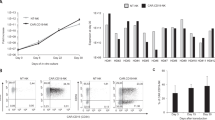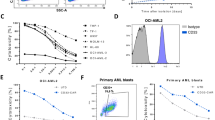Abstract
Gene modification of malignant cells to express immune stimulators (cytokines and immune costimulators) has provided the basis for a novel form of immunotherapy. Using a MPSV-based retroviral vector with hygromycin resistance gene as a selectable marker, we have studied retrovirus-mediated gene transfer of an immune costimulator, B7.1, into primary human acute myeloid leukaemia (AML) cells and the subsequent induction of immune costimulatory function. AML blasts from 10 patients were transduced by co-culture for 48 h with or without haemopoietic growth factors (HGFs). In the absence of HGFs, transduction efficiency (TE), as judged by % B7.1 expressing cells, was low, varying from 0.3 to 8.2% (median 1.5%). Addition of HGFs increased the median TE 1.8-fold with stem cell factor alone and 2.6-fold with SCF, interleukin-3 and GM-CSF. Effects on cell cycling alone could not explain this difference, suggesting other factors such as virus binding and promoter activity, are also involved. CFU-AL assays indicated a higher transduction efficiency of clonogenic cells, which was not improved by growth factors. Limited duration of cell growth prevented significant expansion of transduced populations by culture in the presence of hygromycin. Although not increasing transduction efficiency, CD34 enrichment enhanced drug selection, by targeting cells with the greatest self-renewal capacity. Immunoselection of B7.1 expressing cells produced transduced populations with 30–60% expressing B7.1. In an allogeneic mixed leukaemic cell/T lymphocyte reaction (MLLR), transduced AML cells enriched by immunoselection were able to stimulate allogeneic T cells (CD4 and CD8 positive), which could be inhibited by a solubilised B7 receptor, CTLA4.Ig. Our results demonstrate that using a replication incompetent retroviral vector, it is possible to introduce the immune costimulator B7.1 into primary AML blasts and, by immunoselection, enrich the transduced cells, which may be used for subsequent administration as an autologous cellular vaccine.
This is a preview of subscription content, access via your institution
Access options
Subscribe to this journal
Receive 12 print issues and online access
$259.00 per year
only $21.58 per issue
Buy this article
- Purchase on Springer Link
- Instant access to full article PDF
Prices may be subject to local taxes which are calculated during checkout
Similar content being viewed by others
Author information
Authors and Affiliations
Rights and permissions
About this article
Cite this article
Hirst, W., Buggins, A., Darling, D. et al. Enhanced immune costimulatory activity of primary acute myeloid leukaemia blasts after retrovirus-mediated gene transfer of B7.1. Gene Ther 4, 691–699 (1997). https://doi.org/10.1038/sj.gt.3300437
Received:
Revised:
Issue Date:
DOI: https://doi.org/10.1038/sj.gt.3300437
Keywords
This article is cited by
-
Clinical evaluation of cellular immunotherapy in acute myeloid leukaemia
Cancer Immunology, Immunotherapy (2011)
-
Lytic activity against primary AML cells is stimulated in vitro by an autologous whole cell vaccine expressing IL-2 and CD80
Cancer Immunology, Immunotherapy (2010)
-
International progress in cancer gene therapy
Cancer Gene Therapy (2008)
-
An immune edited tumour versus a tumour edited immune system: prospects for immune therapy of acute myeloid leukaemia
Cancer Immunology, Immunotherapy (2006)
-
Targeted immunotherapy in acute myeloblastic leukemia: from animals to humans
Cancer Immunology, Immunotherapy (2005)



